
Toxic pollution has reached alarming levels in Ogijo and surrounding communities in Ogun State's Sagamu Local Government area, with harmful materials detected at levels a thousand times higher than what's considered safe, according to Ojo-Gbenga Nicholas' investigation.
This environmental disaster has exposed over 11,339 residents to severe contamination, primarily caused by the operations of more than 20 foreign companies in the area.
The presence of pollutants at such extreme levels poses significant health risks, including increased likelihood of respiratory issues, cancer, and other diseases. This is particularly concerning given the large number of people living in the communities. Apart from Ogijo, other affected communities are Mosimi, Likosi, Kamalo, Gbaga, Odonguyan, Odo Kekere Odonla and many more between Sagamu in Ogun State and Ikorodu in Lagos State.
The communities are deprived of clean air as they choke under the effect of air that is highly contaminated with carbon dust generated from melting of scraps converted to iron rods, nails, and others through heat by Sundry, and several others companies.
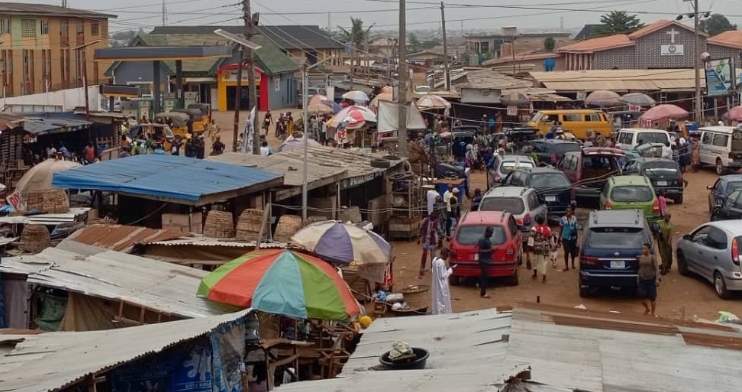
This, however, exposes the residents to pollutants, while the ailments linked to inhalation of toxic fume such as stroke, ischemic heart disease, chronic obstructive pulmonary disease (COPD), lung cancer and many more, are often recorded in the communities.
A recent visit to Ogijo proved to be a disturbing experience, as our team was overwhelmed by the severely polluted air. Upon arriving at the Five Star Junction, a central hub in the community, the air was thick with contaminants, causing irritation and discomfort.
During their extended stay, the team observed a disturbing phenomenon: black dust generated during industrial production formed a dense, dark cloud that gradually dispersed into the atmosphere, settling as soot on nearby buildings. This toxic haze has become a constant presence in the community.
The Processes That Lead To Black Carbon
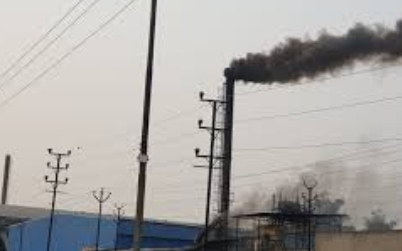
Some of the firms in the area use charcoal and firewood to power furnaces filled with disused tyres to produce pyrolysis oil.
Pyrolysis oil is the end product of waste tyre and plastic pyrolysis. The oil is widely used as industrial fuel to substitute furnace oil or industrial diesel.
The process involved feeding of raw material (waste tyre) into a reactor by full-automatic feeding machine. The reactor will be left with 1/3 space for rotating more smoothly while the door of feeding machine is closed.
The reactor is said to be gently heated by burning the fuel material (coal, wood, natural gas, LPG or tire oil generated from the last batch). The oil gas will be released when the temperature reaches 100℃.
Heavy oil gas separated by manifold will be liquefied and dropped down into the heavy oil tank. The lighter gas will rise up to the oil condensers, liquefied and stored in the oil tank.
After fuel oil is produced, the reactor will be allowed to cool down. Carbon black will be discharged automatically when the temperature drops. Some other companies convert scraps to different products such as rods, nails, etc. through melting.
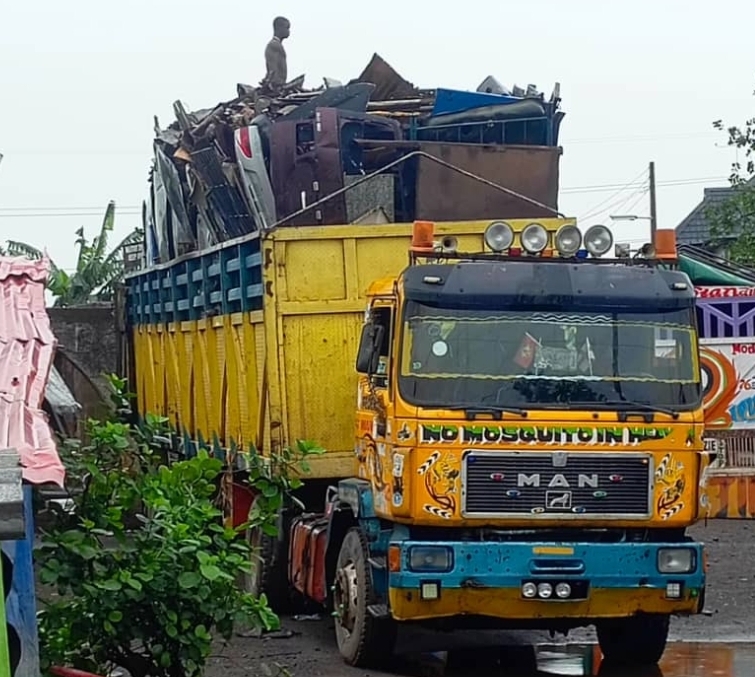
Scrap is usually melted down in an electric arc furnace (EAF), but can also be added to the mix in a basic oxygen furnace (BOF) to control heat in that part of the steelmaking process.
Recycled steel is made from steel scrap. Therefore, the first step is getting the right steel scrap for recycling.
Scrap Metal Dealers collect steel scraps for recycling at buy-back centers, from designated drop-off points, or in person.
Air Quality In The Area Is Highly Contaminated
The results of the air quality assessment that was carried out by Dr. Tolulope Ayo, a geologist with the Federal University of Agriculture, Abeokuta (FUNAAB), witnessed by SaharaReporters shows that both PM2.5 and PM 10 (airborne particulate matter) in the area exceed their permissible limit of 35 and 150 microgram per meters cube.
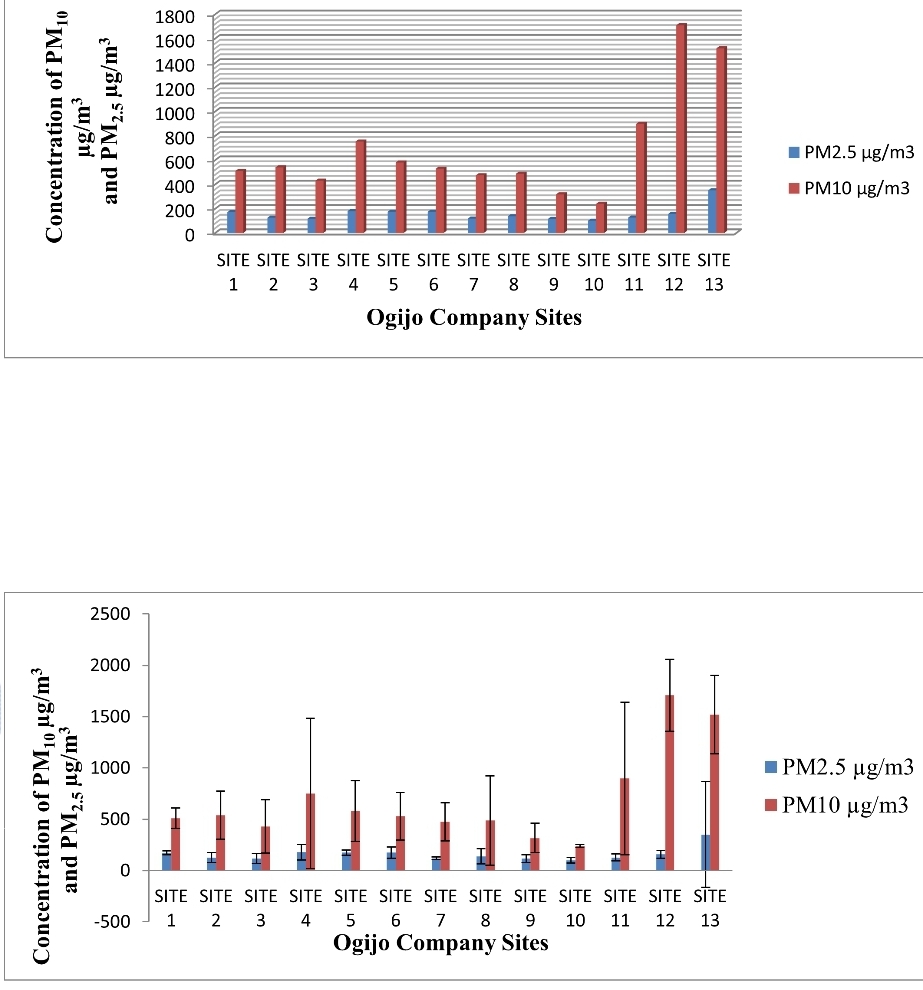
Quoting relevant reports, Ayo said, "The values of PM2.5 ranged from 100.67 to 179.33 µg/m3 and the concentrations of PM10 ranged from 317.17 to 1708.33 µg/m3 across the sampled sites. All the recorded values were above the permissible/regulatory limit set by W.H.O. (25 µg/m3) for PM2.5 and (50 µg/m3) for PM10 for 24-hrs exposure (WHO, 2018).
“The range of PM10 was above the FMEnv allowable limit (250 µg/m3) and US EPA standard of 150 µg/m3 for 24 hours exposure. The concentrations of PM2.5 and PM10 at all locations were quite higher majorly due to periodic movement of heavy-duty vehicles to and fro from the iron and steel companies and the release of emissions/pollutants from the various companies.
“The mean concentrations of CO, CO2, SO2, CH4, H2S, VOC, and NO2 are presented in Table. The concentration of CO monitored across the sampled sites were all above the permissible limit of WHO and FMEnv allowable standards for air quality. High concentration of CO may be attributed to cexhaust from heavy-duty trucks, diesel generator and anthropogenic sources in the industrial sites.
“These particles have a serious impact on urban air quality and public health. Health effects of CO pollution may include eye, nose and throat irritation, headaches, nausea loss, liver and kidney damage (Atubi and Osoyigbo, 2020).
“Furthermore, increase in CO2 levels can have adverse effects such as greenhouse effect which can lead to global warming and other related climatic events. The values of SO2 recorded were above the permissible limit of FMNEnv (0.26 mg/m3), WHO (0.02 mg/m3) for 24-hr limit, NAAQS (0.2 mg/m3) for 1-hr limit. SO2 pollution may result to breathing difficulty, airway inflammation, eye irritation, heart failure and circulatory collapse.
“SO2 recorded could be attributed to movement of diesel motor vehicles use for conveying iron rods and steels from the sampled sites. According to Atubi and Osoyibo (2020), sulphur dioxide is associated with asthma, chronic bronchitis, morbidity and mortality increase in old people and infants.
“Majority of the sampled sites had high concentration of CH4 above the FMEnv permissible limit of 60 mg/m3. The common cause of high concentration of methane in this survey is mainly from external sources and human activities which include use of fossil fuel, decay of wastes, smoking most especially around the sample sites.
“Concentrations of H2S obtained were above the permissible limit (0.01 mg/m3). Hydrogen sulfide is a colourless gas with a strong odour of rotten eggs. A short-term exposure of humans to H2S may cause irritation to the throat, nose, eyes, tiredness, headaches, and breathing difficulties in asthmatic patients. Long-term exposure of humans to H2S may affect the nervous system and respiratory tract (ATSDR, 2016).”
Water In The Communities Not Safe For Consumption
Dr. Hassan Idris, Chief Research Officer in a research institute in Lagos who was also on the ground in Ogijo with SaharaReporters took two water samples from Kamalo and Odongunyan respectively for analysis.
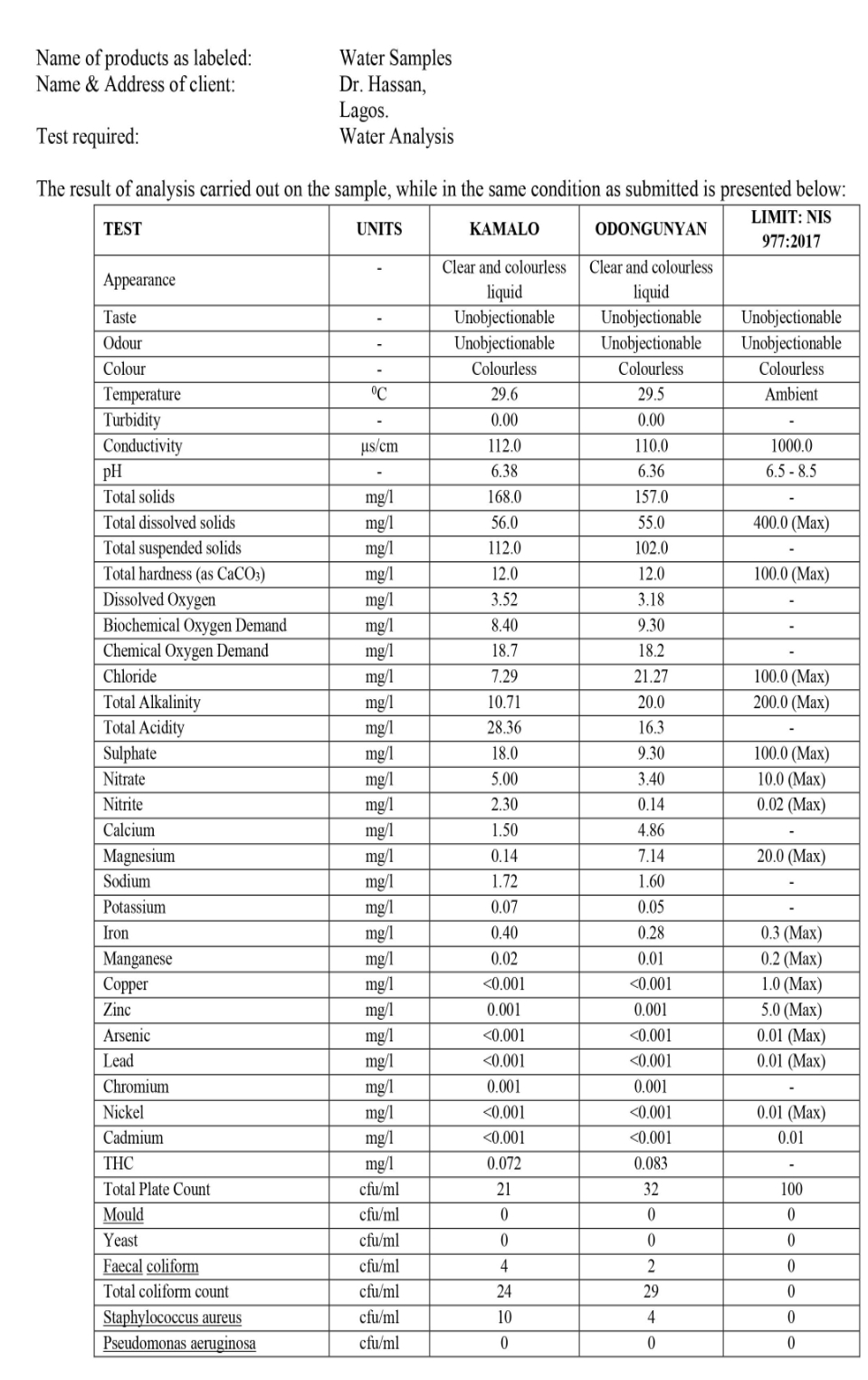
His report reads in part, "Microbiological Quality: Both Ikorodu and Odongunyan samples exceed the limits for faecal coliforms, total coliforms, and Staphylococcus aureus, which indicates potential health risks.
"Nitrite Levels: The nitrite level in Ikorodu exceeds the permissible limit, posing a potential health hazard.
"Iron Content: The iron level in Ikorodu slightly exceeds the permissible limit, which could affect taste and color over time.
"While the chemical properties of the water are mostly within safe limits, the microbiological quality of the water from both locations is concerning, with indicators of fecal contamination and the presence of harmful bacteria. The nitrite level in Ikorodu is also above the permissible limit. These findings suggest that further treatment or filtration is necessary to make the water safe for consumption.”
Concern Over Pregnant Women, Nursing Mothers And Children In The Community
“We inhale poisonous gases and carbon 24 hours. My first son, who is 10 years old, has been admitted thrice in the hospital for asthma as a result of this problem,” a resident said.
When SaharaReporters visited Ogijo Primary Heath Care, women and medical officials complained about the pollution, and its harmful effects to children.
One of the nurses told SaharaReporters, “I learnt that exposure to this fume blocks the lung of children, this is so bad and not even fair at all.”
In the register of the health centre sighted by SaharaReporters, irritation to the throat, nose, eyes, tiredness, headaches, and breathing difficulties tops the list of sicknesses reported.
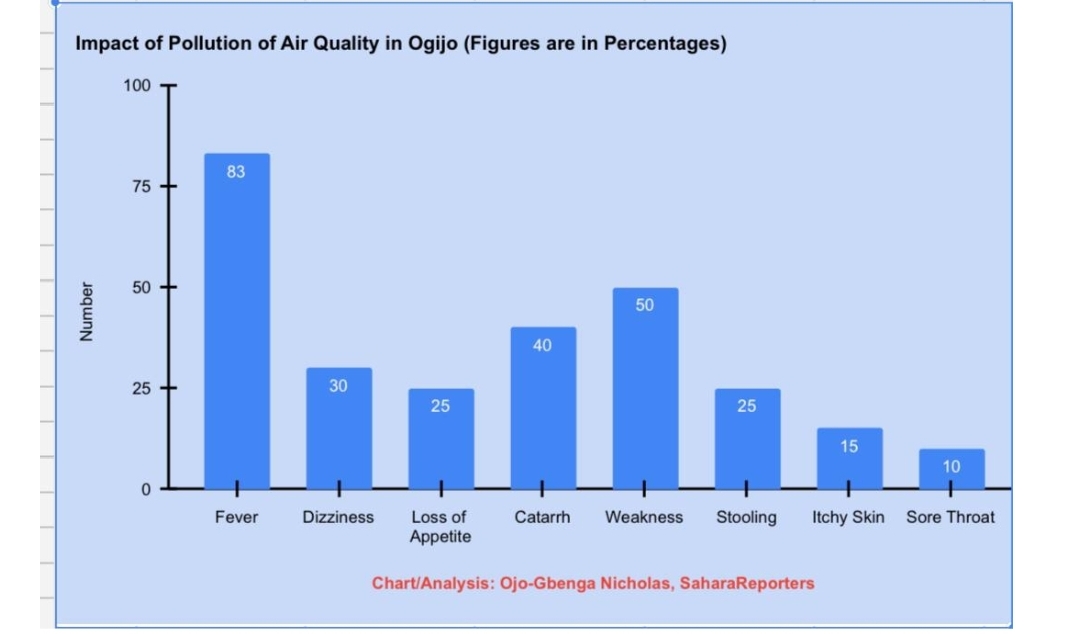
We Work Like Slaves, Staff Members Lament
Some workers employed by the companies raised concerns over what they described as inadequate payment and unfavourable working conditions while melting the scraps.
According to several workers who spoke to SaharaReporters on condition of anonymity, they are paid a daily wage of N800, equivalent to N67 per hour. While some senior and experienced workers are being paid N1,500 daily, equivalent N125. However, this wage, they claim, barely covers their daily expenses, including meals and transportation to and from work.
Some workers of the companies also decried poor treatment meted out to them by the firms.
One of the workers said, "Our working condition is not different from a slave; we operate morning and evening shift. Morning shift is from 7am to 7pm while night shift is from 6:30 pm till dawn, yet, we are being paid peanuts. The people with the most difficult job (doing the real heat job) are being paid N1,500 daily while others receive N800 per day.
“We work throughout the year and there is no form of social benefit like insurance.
"We deposited the scrap in a big pot mixed with some chemicals on a gas to melt the scraps. Our main problem there is the smoke because they don't cover the smoke. No chimil (a big industrial pot) to cover the smokes.
"When we start working, the smokes cover everywhere and when the smoke enters our body and nose, it makes us sick most times.
"We always get sick because of the smell of the scrabs remnant and heat we are exposed to. The highest amount we are being paid is N1,500 daily and they used to give us one tin of milk weekly but it has stopped for now.
"We are entitled to milk and heat bonus but the companies don't care about it. Meanwhile, the white guys run shifts every two hours.”
When our correspondent walked into one of the local restaurants opposite one of the companies, he discovered that the plate of food that cost the least was N1,700.
Powerful People Behind It Challenges
There are whispers that powerful figures who formed an association are involved in the activities and this has fueled a sense of helplessness among the workers. Investigation revealed the members of association who include some prominent people in the communities are changing cars monthly.
"Our top leaders are being settled time to time by the companies. While some of them are given contracts or access to the remnants of the scrap; it is good money too.
"Nobody can challenge them because they are so powerful and can kill anyone blocking their way," a source said.
Another source who is one of the community leaders said, “We are trying, but if the power is more than what one can handle, nothing can be done. The owners of the companies are very powerful.
“In fact, when some people here wanted to travel abroad, they went for some tests, you need to see what they found in their body systems. The dust also penetrates and destroys our roofing sheets; that is why some changed theirs to asbestos roof.
“There are some sets of landlords that are betrayers, they have been collecting money from the companies.
“The communities are not benefiting anything from the companies. They refused to give us light, instead they sell to us. The one that built a small clinic for us refused to stock it.
"We went to the Ogun State Ministry of Environment and the Ogun State Environmental Protection Agency (OSEPA) with petitions over the activities of the companies. But all our letters were thrown back at us when we were leaving.”
"They are powerful and have people everywhere," the source added.
Most Of The Companies Were Established Over 40 Years Ago
Oladimeji Oresanya, Commissioner for Environment in Ogun State, told SaharaReporters that most of the industries were established over 40 years ago. He added that they took advantage of the poor regulatory space and brought in old decommissioned equipment from Europe and Asia to establish the industries in Nigeria.
He said, “As a regulatory organ of government, we observed the same deficiencies when we resumed office about 5 years ago.
“We took the following steps immediately; we commissioned a study to confirm the academic reports. The study affirmed the findings.
“We invited all the companies to a consultative meeting where we gave them ultimatum to install pollution abatement equipment or risk being shut down.
“We equally observed that most of the industries affected are the steel companies and cement industry. They all committed to a plan of action on the timeliness for installation of the abatement implements.
“The timeliness ranges from 6 to 48 months. Most of the equipment is not available off the shelf. They are customized and required long-term fabrication. After the expiration of the moratorium, the cement factory production line was shut down till today.
“About seven industries were shut down at various times in the last three years along that axis for the delay in compliance.
“We always have to reopen the industries after a while when we consider the social and economic consequences of the shutdown on the community and the risk of de-marketing the national economy.
“The mitigation measures from our end include the closer monitoring for minimal impact while we uphold the threat of renewed closure if the abatement project is visibly not progressing.
“But many of them have been reviewing their timeliness blaming it on the global and local economic recession.
“We have also constituted the affected communities into monitoring groups for some of these industries who are operating beyond the safety threshold of minimal impact.
“My personal observation of the whole situation shows that most of these industries were established over 40 years ago. They took advantage of the poor regulatory space and brought in old decommissioned equipment from Europe and Asia to establish these industries in our country.
“They are presently struggling to comply with the new standards and improved regulatory conditions. It's affecting their business process and financial projection.
“They are definitely going to comply if we remain focused and unyielding.”
Clear Violation Of Several Nigerian Environmental Laws
An Abuja-based lawyer, Olufemi Olatunde Atetedaiye, in his legal opinion explained that the environmental pollution crisis in Ogun State, particularly in Ogijo, presents a clear violation of several Nigerian environmental laws. He added that the affected communities have legal grounds to seek redress through administrative, civil, and criminal channels.
He said, "The situation in Ogun State, particularly in Ogijo and surrounding communities, presents a significant environmental and public health crisis due to the activities of over twenty foreign recycling plants. These facilities have been linked to severe air and soil pollution, adversely affecting the health of local residents and the quality of the environment. This legal opinion outlines the relevant Nigerian laws, potential legal precedents, and appropriate sanctions applicable to the situation.”
Relevant Nigerian Laws
Environmental Impact Assessment (EIA) Act (1992)
The EIA Act mandates that any project likely to have significant environmental impact must undergo an environmental impact assessment before commencement. The failure of the recycling plants to conduct proper EIAs could render their operations illegal.
National Environmental Standards and Regulations Enforcement Agency (NESREA) Act (2007)
NESREA is responsible for enforcing environmental laws and regulations in Nigeria. The Act provides for the establishment of standards for environmental quality and the prevention of pollution. Violations of these standards can lead to sanctions, including fines and closure of facilities.
Federal Environmental Protection Agency (FEPA) Act (1988)
This Act established the Federal Environmental Protection Agency, which is tasked with protecting and improving the environment in Nigeria. It provides the framework for environmental management and pollution control.
Pollution Control Regulations (2009)
These regulations set specific limits for various pollutants, including particulate matter (PM2.5 and PM10), and outline the responsibilities of industries to monitor and control emissions.
Nigerian Constitution (1999)
Section 20 of the Constitution mandates the state to protect and improve the environment and safeguard the water, air, and land for the benefit of present and future generations.
Criminal Code Act (1990)
Under the Criminal Code, actions that cause harm to the environment can be prosecuted as public nuisance or endanger public health.
Nigerian Minerals And Mining Act (2007)
This enactment regulates the orderly and sustainable development of Nigeria’s mineral resources.
The Petroleum Industry Act (2021)
Section 202 of this Act provides regulations on the general duties of a petroleum products distributor.
Legal Precedents: A.G. Abia State v. A.G. Federation (2002) 6 NWLR (Pt. 763) 264
This case established the principle that the government has a duty to protect the environment and that failure to do so can lead to legal action against the responsible parties.
Ogun State Environmental Protection Agency v. Adebayo (2010) 1 NWLR (Pt. 1176) 1
This case reinforced the authority of environmental regulatory bodies to enforce compliance with environmental standards and the legal consequences of non-compliance.
Nigerian Breweries Plc v. A.G. Lagos State (2009) 10 NWLR (Pt. 1150) 1
The court held that companies must adhere to environmental regulations, and failure to do so can result in sanctions, including the shutdown of operations.
Helios Towers Nig. LTD v. NESREA & ANOR (2014) LPELR-24624(CA)
The court interpreted sections 12, 14(2) and 42 of the Environmental Impact Assessment Act with respect to the body empowered to issue Environmental Impact Assessment Certificate and resolved this issue in the appeal in favour of the 1st respondent (NESREA).
Mondinvest LTD v. Dredging Environmental & Marine NV (2018) LPELR-44727(CA)
Here, the court held that an Environmental Impact Assessment report before commencement of dredging is a requirement of law.
The environmental pollution crisis in Ogun State, particularly in Ogijo, presents a clear violation of several Nigerian environmental laws. The affected communities have legal grounds to seek redress through administrative, civil, and criminal channels.
Regulatory authorities must enforce compliance with existing laws, and affected residents should be empowered to pursue legal action to safeguard their health and environment. The legal framework in Nigeria provides robust mechanisms for addressing environmental pollution, and it is crucial that these laws are applied effectively to hold polluters accountable.
The government must also consider the social and economic implications of enforcement actions, ensuring that the rights of residents are protected while promoting sustainable industrial practices.